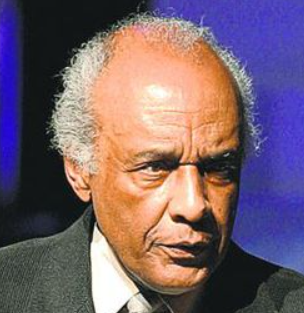Gilbert Edward Noble was a pianist, producer, professor, news anchor, television host, and documentarian. His entry into media was largely due to the Civil Rights and Black Power Movements. Born in Harlem, New York on February 22, 1932 to Jamaican parents Iris Villiers Noble, a teacher, and Gilbert Robert Noble, an auto-mechanic shop owner, he grew up in a middle-class household on Harlem’s famed Sugar Hill.
A 1949 graduate of DeWitt Clinton High, which also graduated Countee Cullen (1922) and James Baldwin (1942), Noble served as a medic in the US Army during the Korean War and worked at a New York City public library while attending City College of New York. He also occasionally modeled while employed at Union Carbide. On August 7, 1959 Noble married Norma Jean Johnston, a nurse, in a ceremony in Moscow, capital of the then Soviet Union. The ceremony was witnessed by US ambassador Llewellyn Thompson and covered by Ebony and Jet magazines. The couple then honeymooned in Paris, France.
Noble joined Manhattan Chase bank and organized the Gil Noble Trio alongside childhood friend alto saxophonist Jackie McLean. In 1964-1965, Noble did radio and TV voiceovers while taking speech lessons at Weist-Barron School from the Dwight Weist, “the man of 1,000 voices.” In 1965, Harlem-based WLIB-1190-AM hired Noble as a news reporter.
In July 1967 Noble became a WABC-TV correspondent which at the time was one of the three major T.V. stations in New York City. Promoted to weekend co-anchor in February 1968, he initially co-hosted Like it Is with actor Robert Hooks. When Hooks left the show to star in N.Y.P.D., Noble hosted Like it Is alone for 43 years as it became the second longest-running US Black public affairs program after American Black Journal. His periodic co-hosts included Melba Tolliver, Carol Jenkins, Geraldo Rivera, and Afro-Puerto Rican Felipe Luciano. In 1975, Noble began producing with Susan Robeson (Paul Robeson’s granddaughter), the historical research of Sunni Khalid, Paul Lee, and pan-Africanist Elombe Brath.
In 1984, Noble established the National Black Archives of Film and Broadcasting in New York City to preserve and distribute materials on the Black experience. After his death his children moved the collection to Montclair, New Jersey. New Jersey City University’s Hagan Africana Studies Center and holds nearly 850 Like it Is interviews with prominent figures such as Pura Belpré, Fannie Lou Hamer, Angela Davis, Bahiyah Betty Shabazz, Sarah Vaughan, Les Payne, Herb Boyd, John Henrik Clarke, Asa G. Hilliard, Leonard Jeffries, Ivan Van Sertima, Yosef Ben-Jochannan, Robert A. Hill, Louis Farrakhan, Bob Marley, Michael Manley, Maurice Bishop, Kwame Touré, Sékou Touré, Nelson Mandela, Thomas Sankara, Julius Nyerere, and Robert Mugabe.
A 45-year resident of Montclair, New Jersey, Noble taught media classes at area institutions of higher education including Saint Peter’s, Seton Hall, Ramapo, and New Jersey City University. His fifty-two-year marriage produced four daughters and a son. A Jazz Foundation of America board member, Noble won seven Emmy Awards, a John Russwurm Award, and a National Association of Black Journalists, “Journalist of the Year” Award and was posthumously inducted into its Hall of Fame. Malcolm X, Mercy, Seton Hall, Medgar Evers, Hofstra, and New Jersey City University bestowed honorary doctorates on Noble. Gil Noble died at the age of 80 in Wayne, New Jersey on April 5, 2012.

